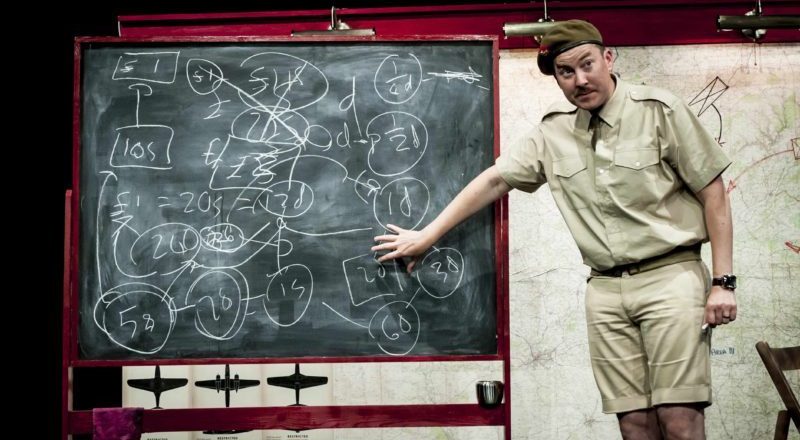INTERVIEW: American, British cultures clash in ‘Instructions for American Servicemen’
Photo: Instructions for American Servicemen in Britain stars Matt Sheahan, who also co-wrote the comedy. Photo courtesy of Lidia Crisafulli / Provided by Karen Greco PR with permission.
Instructions for American Servicemen in Britain, a new comedy playing New York City’s 59E59 Theaters, is a look back at 1942, a time period that seems anything but hilarious. However, the folks at The Real McGuffins are not interested in theatricalizing the intricacies of World War II. Instead, writer-performers Dan March, James Millard and Matt Sheahan dive deep into an actual instructional manual that was was given to the American military to help them understand British culture.
The ensuing back and forth between these allies creates some interesting and humorous exchanges. Dialect, the boiling of food and weather are common topics.
Instructions, directed by John Walton, runs through May 12 at the Midtown Manhattan venue. Recently Hollywood Soapbox exchanged emails with Walton about the comedy, which is presented as part of 59E59’s Brits Off-Broadway festival. Questions and answers have been slightly edited for style.
What’s the key to directing an effective comedy?
I think you’ve got to aim high — gentle chuckles from the audience are not enough. I want the audience laughing deep from their bellies. I want them going home with their ribs aching. To achieve this I think you need a great script, brilliant performers and time to test the show in front of an audience.
In terms of the script — I think it’s important to focus as much on the dramatic framework as the gags. What distinguishes great comic writers is not just their wit, but the way they use character, situation and jeopardy to amplify the laughs. How can you push your characters to the extremes of human behaviour? This is where things can get uncontrollably hilarious.
Casting is also fundamental. In the UK we say that a naturally comic actor has ‘funny bones’ — they’re the ones that can make you laugh with just a look on their face or a slight change in the tone of their voice. They have a joyful, playful spirit that is infectious. If your actors don’t have funny bones, you’re doomed.
Finally, you’ve got to have time to work the material in front of an audience. When we were making this show we gigged a lot of the material in sketch comedy nights and did work-in-progress performances. It’s only then that you can hone the laughs, cut the chaff and, crucially, get the rhythm of the show right.
What inspired this production? Is it truly based on a 1942 instructional manual to American servicemen?
It is indeed! The pamphlet was written by an unknown American for the U.S. War Department and distributed to all GIs heading to Britain during World War II. I think everyone knows how strange us Brits can be, but what I loved about the pamphlet was how it placed all that eccentricity into a high stakes situation. Hitler’s propaganda machine was doing everything it could to split the Allies apart, and the future of the world genuinely depended on U.S. and British soldiers overcoming their differences and fighting side by side. Between that jeopardy and the huge differences between the countries, I knew we could find great comedy.
What do you believe the show says about the connections and differences between Americans and the British?
If anything, I think the show encapsulates the Bernard Shaw quote: ‘two countries divided by a common language.’ We see these two very proud nations that just can’t understand each other, or work out where the other is coming from. The Americans in the show get annoyed at what they see as the ridiculous habits of the Brits, and the Brits get annoyed because the American ‘invaders’ ride roughshod over their cherished traditions and genteel way of life. Ultimately though, everyone realises that what they share is stronger than what divides them. I don’t think much has changed today.
Do you believe the show will play the same way it did in the UK? Will the laughs be the same?
When we play the show in the UK, the audience are very much laughing at themselves. They’ll be some kind of classically absurd British behaviour onstage, and the audience will be laughing because actually, it’s quite ordinary for us to behave in that way. In the U.S. I think the audience’s journey will be much closer to that of the American characters in the play, which is basically one of constant incomprehension and jaw-dropping shock as yet another crazy facet of British behaviour is revealed. We really are a strange nation.
What is it like working with this ensemble of actors?
I wrote and created the show with the British sketch-comedy troupe The Real MacGuffins, who are a huge amount of fun to work with. When I was imagining the show I just had an instinct that they’d be the perfect match for the material — they’re incredibly smart but also very warm and idiotic, which reminded me of the classic sitcom and radio comedies that I loved as a kid.
It was also brilliant to tap into the on-stage dynamic that they’ve spent years perfecting, which meant finding characters and creating routines was a lot easier. Making a show is always a bit stressful, but mainly we just spent lots of time mucking around making each other laugh, which I think is reflected in the joyous silliness of the show itself.
By John Soltes / Publisher / John@HollywoodSoapbox.com
Instructions for American Servicemen in Britain, produced by Fol Espoir with Jermyn Street Theatre and The Real MacGuffins, plays through May 12 at 59E59 Theaters in New York City. Click here for more information and tickets.

